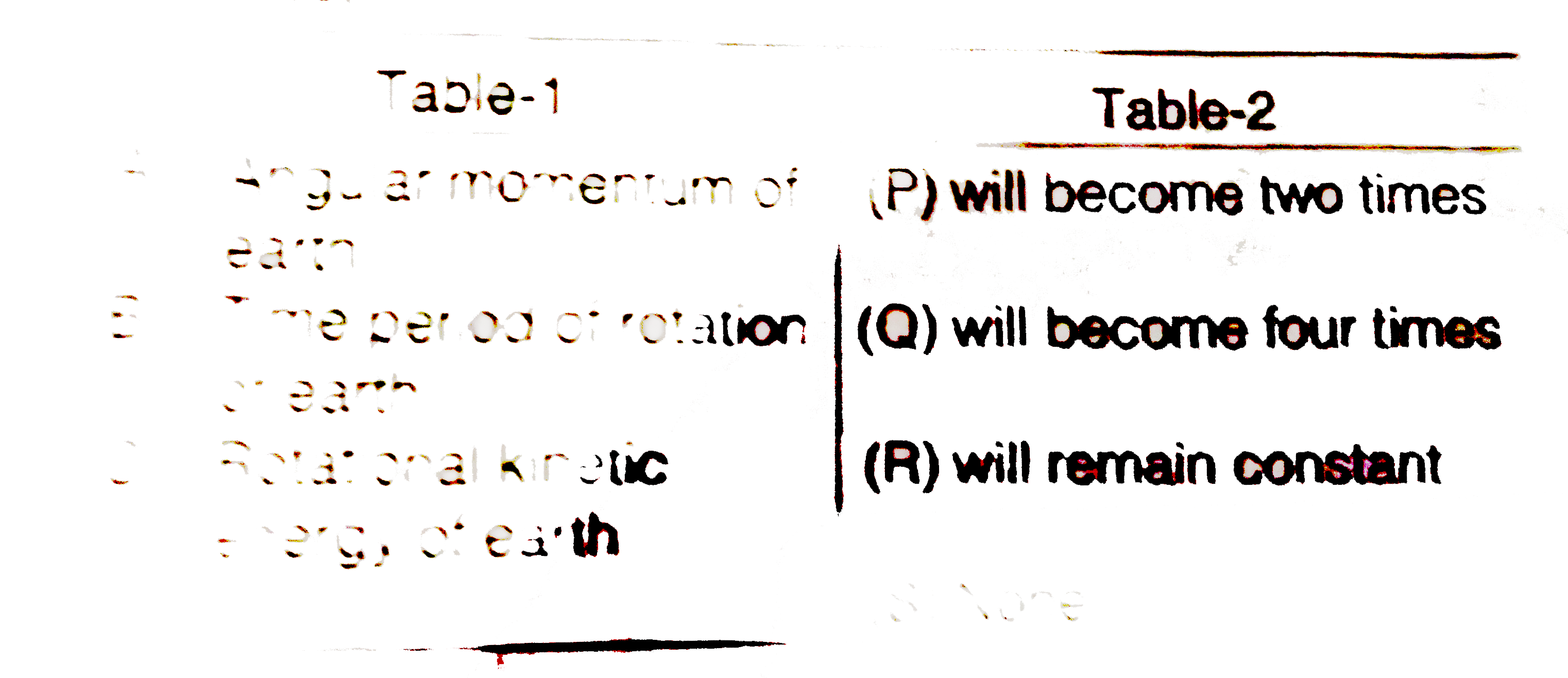A satellite is revolving around earth in its equatorial plane with a period T. If the radius of earth suddenly shrinks to half without change in the mass. Then, the new period of revolution will be
8T
2√2T
2T
T
The correct Answer is:D
To solve the problem, we need to understand how the period of a satellite in orbit is affected by the radius of the Earth. The period T of a satellite in a circular orbit is given by the formula:
T=2π√r3GM
where:
- T is the orbital period,
- r is the distance from the center of the Earth to the satellite,
- G is the gravitational constant,
- M is the mass of the Earth.
1. Initial Conditions:
Let the initial radius of the orbit be r (which is the radius of the Earth plus the altitude of the satellite). The period of the satellite is given as T.
2. Change in Radius:
According to the problem, the radius of the Earth shrinks to half. Therefore, the new radius r′ of the orbit will be:
r′=r2
3. New Period Calculation:
We need to find the new period T′ using the same formula:
T′=2π√(r′)3GM
Substituting r′=r2:
T′=2π
⎷(r2)3GM=2π
⎷r38GM=2π√r38GM
4. Relating New Period to Old Period:
We know from the original period:
T=2π√r3GM
Now, we can express T′ in terms of T:
T′=2π√18√r3GM=T√8=T2√2
5. Final Answer:
Therefore, the new period of revolution when the radius of the Earth shrinks to half is:
T′=T2√2
- T is the orbital period,
- r is the distance from the center of the Earth to the satellite,
- G is the gravitational constant,
- M is the mass of the Earth.
Let the initial radius of the orbit be r (which is the radius of the Earth plus the altitude of the satellite). The period of the satellite is given as T.
According to the problem, the radius of the Earth shrinks to half. Therefore, the new radius r′ of the orbit will be:
r′=r2
We need to find the new period T′ using the same formula:
T′=2π√(r′)3GM
Substituting r′=r2:
T′=2π
⎷(r2)3GM=2π
⎷r38GM=2π√r38GM
We know from the original period:
T=2π√r3GM
Now, we can express T′ in terms of T:
T′=2π√18√r3GM=T√8=T2√2
Therefore, the new period of revolution when the radius of the Earth shrinks to half is:
T′=T2√2
Topper's Solved these Questions
- GRAVITATIONBOOK - DC PANDEYCHAPTER - GRAVITATIONEXERCISE - Level 1 Subjective
19 Videos
- GRAVITATIONBOOK - DC PANDEYCHAPTER - GRAVITATIONEXERCISE - Level 2 Single Correct
22 Videos
- GRAVITATIONBOOK - DC PANDEYCHAPTER - GRAVITATIONEXERCISE - Level 1 Assertion And Reason
11 Videos
- GENERAL PHYSICSBOOK - DC PANDEYCHAPTER - GENERAL PHYSICSEXERCISE - INTEGER_TYPE
2 Videos
- KINEMATICSBOOK - DC PANDEYCHAPTER - KINEMATICSEXERCISE - INTEGER_TYPE
11 Videos
Similar Questions
Knowledge Check
If the radius of earth shrinks by 0.2% without change in its mass, the % change in its angular velocity is
Aincreases by 0.4%Bincreases by 0.1%Cdecreases by 0.4%Ddecreases by 0.1%If the earth suddenly charges its radius x times the present value, the new period of rotation would be
A6x2hB12x2hC24x2hD48x2hIf the earth suddenly shrinks (without changing mass) to half of its present radius, the acceleration due to gravity will be
Ag/2B4gCg/4D2g
A satellite revolving around Earth loses height. How will its time period be changed?
View SolutionA satellite is orbiting around the earth with orbital radius R and time period T. The quantity which remains constant is
View SolutionIf the earth suddenly shrinks (without changing mass) to half of its present radius, then acceleration due to gravity will be
View SolutionIf the radius of the earth shrinks by 0.2% without any change in its mass, the escape velocity from the surface of the earth
View SolutionIf the earth suddenly shrinks (without changing and half of its present radius , the acceleration due to gravity be
View Solution
